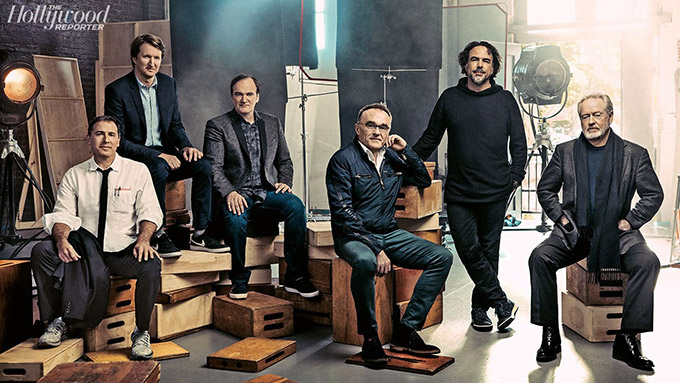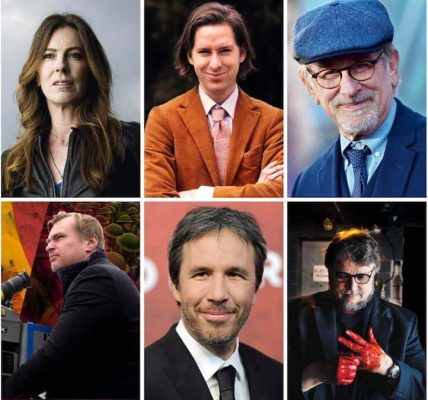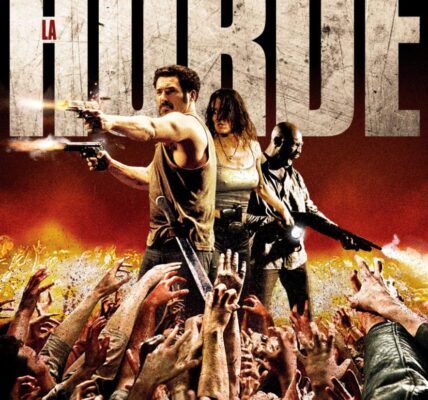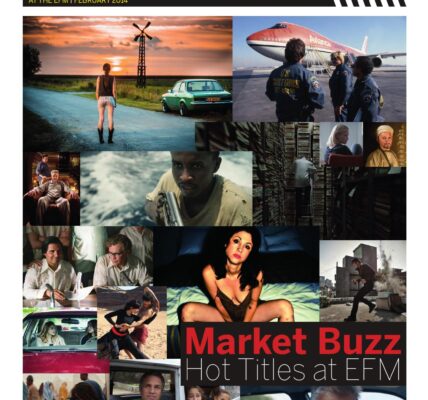Director’s Roundtable – UK directors talk filmmaking – |
It’s 5 p.m. at the British Film Institute on London’s Southbank. The bar is buzzing, awash with film fans about to gorge themselves on retrospectives of François Truffaut and Howard Hawks. But just yards away, in the Project Space, a new generation of filmmakers is forming. movieScope has gathered together four rising British directors, with the intention of getting them to talk amongst themselves (with a little help from us) about their experiences in the UK film industry.
Of the quartet, Simon Rumley is arguably the most experienced, with his first two films, Strong Language (2000) and The Truth Game (2001), both shown at the BFI, before he completed his self-described ‘youth trilogy’ with Club Le Monde (2002). More recently, his work has taken a darker turn with award-winning films The Living and the Dead (2006) and Red, White & Blue (2010), his first US-shot picture, starring Noah Taylor, which will be released in the UK in May.
Sitting next to him is Gareth Edwards, fresh from winning three gongs (including Best Director) at the British Independent Film Awards for his debut film Monsters, which also saw him nominated for a BAFTA for Outstanding Debut. Coming from a visual effects background (“People always say that like it’s another country,” he laughs), Edwards famously created the FX for Monsters on his home computer, after shooting for three weeks in Mexico with a skeletal crew and a budget to match.
Paul Andrew Williams made his debut, the compelling urban drama London to Brighton, back in 2006, receiving the same sort of universal praise as Edwards. Winning the Evening Standard award for Most Promising Newcomer, a category he was also nominated in at the BAFTAs, Williams saw the film win a host of prizes in Edinburgh, Dinard, and at Raindance and BIFA. He followed it with a deliberate U-turn, with the genre-bending The Cottage in 2008, before delivering the taut home invasion tale Cherry Tree Lane last year.
Alongside sits Marc Price, whose British zombie movie Colin became the story of the 2009 Cannes Film Festival, when it played in the market. Telling its tale from the zombie’s point of view, the film took the Croisette by storm when it was revealed that Price had made the film for the princely sum of £45—half of which, apparently, went on a crowbar. With plans to make Thunderchild, a film set entirely inside a WWII bomber, he is currently filming Magpie, with many of the cast from Colin. And it’s with him that we begin…
OK, let’s talk about how you all got your starts…
Marc Price I just had some mates and a camcorder really. The idea for Colin came along and I thought, ‘Hey, this is kind of cool. We can do this.’ I knew enough actors that could play the parts we needed for the film. I also knew locations we could go to that would be very desolate and empty during the middle of the day. And that was it really. I got lucky. I had a sales agent who was very enthusiastic. She insisted on going to Cannes, which I thought was a really terrible idea. Then I did an interview with an ITN journalist and it came up, how small a film we made. Then the Press Association got involved after that, and then it exploded.
Simon, your start was extremely low-budget too, with Strong Language…
Simon Rumley I was just working it out. Mine was actually 100 times more expensive than Marc’s! I had £4,000. My granny had died and she left me that. I’d had it for a while. I’d spent a while trying to get a feature off the ground. I’d written a bunch of shorts, which I’d also made. At some point, when the film that I thought was going to happen didn’t, I thought, ‘Fuck it. I’m going to use the resources that I have to basically shoot something.’ And that was Strong Language. It was £4,000 and most of it went on film stock. It was shot on Super 16 and video, but with Super 16, we couldn’t get many deals. Certainly if we shot it now, it would be cheaper.
Gareth Edwards My start came mainly through a meeting at Vertigo Films. I pitched this concept, showed them previous work, and they were all like, ‘Let’s do it.’ To the point where I didn’t believe them. It was too straightforward! I actually went away for a year, and worked in telly again, because I thought they had to be full of crap. They were just saying, ‘You’ll shoot on this day, we’ll go here, then we’ll edit it, and then you’ll be finished, and then we’ll release it.’ It was weird. You’ve been waiting all your life for someone to say that to you. When I heard it, I just thought, ‘I’m imagining this but it can’t be real.’ So I didn’t take them up on it. And a year went by, and I came back. They went, ‘What the hell happened there?’ They convinced me that they were genuine. So out of paranoia I gave them a start date that was three months away, thinking I could probably figure out the story by then.
 So you hadn’t written the script at this point?
So you hadn’t written the script at this point?
Gareth No! It was just, ‘It’s got to be a monster movie. And we’ll shoot it like a documentary, and use improvisation and use real people, and that will make it more real.’ And beyond that I didn’t have anything specific. But [turning to Marc] your film really caught people’s imaginations. We had the same issues. We had a £15,000 price tag on ours… which is a lot of money compared to what you did.
Marc But your film looks like a real movie—that’s the big difference! You couldn’t screen mine at the Empire Leicester Square! I think the focus was the right thing. You were focusing on story and character.
I started a film for Columbia, and then I walked off after a week. It was the worst experience of my life. – Paul Andrew Williams
Paul Andrew Williams It can never be about the budget. There are fucking loads of low-budget movies made. So it has to be all about the actual film itself. It’s difficult. When London to Brighton was done, I plucked a figure out of the air—like, ‘We’ll do it for £60,000.’ We raised the £60,000. And didn’t think anything of it. I was so used to making shorts for not very much money, so I thought, ‘That’s loads. That’s our parameters and we’ll spend it.’ And when it was finished, there was this thing about, ‘Should we tell people what it had cost?’ The thing is, there’s an element of a gimmick, like, ‘Oh, they made this for that. That’s amazing.’ Often that can be the first talking point before you come to the quality of the film.
Have you all given thought to why you actually make films?
Paul The reason I make films… I’ve asked myself this loads of times. I think that filmmakers and people who do any sort of art, whether it’s music or painting or sculpture… it’s a really good thing to be able to evoke an emotion. Whether it be laughter, joy, fear, whatever.
Gareth My honest answer is I do it because I want people to like it. I’ve learnt to disconnect emotionally. But I’m lying if I say I don’t care what anyone thinks. I totally care what people think. That’s the reason I do it.
Paul But do you care what everybody thinks? So if somebody watches your film, and they don’t like it… but they’re not saying you’re a bad filmmaker…
Gareth That’s fine. If it comes down to do you want to please the majority, or do you want a small percentage to love it and a small percentage to hate it, I would go for the love-hate one. But then you start going, ‘What am I trying to do here?’ For me, the greatest moment of a career would be if you one day sat in the cinema as an old man, and you saw this amazing film, the filmmaker came up to you afterwards and said, ‘You’re one of the reasons I got into film.’ That would be the perfect passing of the torch.
Simon I did that to Ken Russell recently in Montreal. I think he was a bit doddery and didn’t quite understand me!
All of your films have enjoyed a healthy existence on the festival circuit; how have you found that?
Marc I felt it was great. I was really nervous about FrightFest. I really felt like I was out of my depth, and I didn’t belong there at all. But after that, all the festivals I went on, it was just amazing. I’m still terrified—that it will be like when I walk in, like I’ll get shit thrown at me. But it’s been amazing. The Q&As have been great so far. I haven’t been lynched.
I’m lying if I say I don’t care what anyone thinks. I totally care what people think. That’s the reason I do it. – Gareth Edwards
 Gareth What is a lynching—officially? What has to happen?! I’ve had people come up to me and have a go at me about the film. I found that a bit shocking when it first happened. Someone came up and went, ‘Why did you call it Monsters?’ And I came out with the usual stuff, and he went, ‘But it’s not a monster movie!’ I said, ‘What would you call it?’ And he just wanted an argument. He was livid. He looked like he was ready to punch me. It really threw me for the rest of the day, that someone was that angry.
Gareth What is a lynching—officially? What has to happen?! I’ve had people come up to me and have a go at me about the film. I found that a bit shocking when it first happened. Someone came up and went, ‘Why did you call it Monsters?’ And I came out with the usual stuff, and he went, ‘But it’s not a monster movie!’ I said, ‘What would you call it?’ And he just wanted an argument. He was livid. He looked like he was ready to punch me. It really threw me for the rest of the day, that someone was that angry.
Simon At SXSW, we had a screening where someone had to be physically thrown out of the theatre. Harry Knowles was there and he wrote this great headline saying ‘I saw Red, White & Blue break a woman’s brain!’ And he said, ‘I’ve often heard about films that have mentally destroyed people, but until Simon Rumley’s Red, White & Blue, I have never actually seen one myself!’ This woman basically watched the film, and there were a bunch of us on stage after the film had finished. And this woman stood up and shouted, ‘I want to ask a question! I want to ask a question!’ And she asked me a few questions, which I tried to answer, but she kept interrupting me. And then she started crying… and was eventually escorted out.
Paul We had a screening [of London to Brighton] at BAFTA, and we’d shot in the year before, but after it finished, someone said, ‘Surely you should feel a bit responsible for the murders in Ipswich recently?’ There were five prostitutes who’d been killed. And I said, ‘Well, we made it last year…’ And they said, ‘Yes, but you’re showing prostitutes in dangerous situations.’ And luckily the whole audience swarmed around her, saying ‘You’re being ridiculous.’ To the point where you start feeling sorry for them.
Simon I’d love to show my films at BAFTA. Certainly Red, White & Blue and The Living and the Dead, because I’d love to assault the BAFTA audiences. I’m pretty sure nothing like them has ever been shown at BAFTA. It’s usually a more woolly audience.
Gareth I’d like to ask Marc a question. In a weird way, your story is as much as anybody’s is presented as ‘Look what this guy, with these few resources, went and did.’ And what that’s really saying essentially to all the other filmmakers who want to break into filmmaking, is that maybe you could follow this route. As someone who has trailblazed that route, what would your advice be to someone who’s thinking of making a film for £45?
 Marc Just do it. Just find a way to do it. I was speaking to another film director, who had success with his first film. And he had an idea for his second film, which sounds great and it can be made for a reasonable amount of money. But he was struggling so hard to get that money, and it’s been such a long time since his last film… and it was at that point that I decided we’re going to make our next film, Magpie, at whatever cost.
Marc Just do it. Just find a way to do it. I was speaking to another film director, who had success with his first film. And he had an idea for his second film, which sounds great and it can be made for a reasonable amount of money. But he was struggling so hard to get that money, and it’s been such a long time since his last film… and it was at that point that I decided we’re going to make our next film, Magpie, at whatever cost.
So you didn’t have any offers after Colin?
Marc Well, the sort of offers we were having were where financiers would say, ‘We need £1m to cover our overheads!’ I was like, ‘What? That’s crazy!’ And we were dealing with the bottom-feeding financiers. And they’d be like, ‘You’ve got to use our cameramen. You’ve got to use our editors.’ And you’d see the quality of the work—it was atrociously bad! Then at the other end of the spectrum, we had those who were offering not much at all. There was no happy medium. Nothing was really working for us. I think we’re still in that holding pattern. Frankly, I was bored sitting around, twiddling my thumbs, so we decided to make Magpie in much the same way we did Colin.
Simon That’s pretty much the industry. When you make your first film—especially if you’re getting some good reviews—you think, ‘Yeah, this is it!’ And you think everyone cares as much as you do.
Marc But you’ve still got to take control of your next project and take advantage of what you’ve got—what you might have built up to get that next project going.
Paul I look [at] it like you’ve lit a match. It’s fucking bright and everyone is after you, and then it starts to get out, and then it goes black! When London to Brighton came out, I remember just walking into the BBC. They said, ‘We really like you. We really want to work with you.’ And I pitched this idea, and they said, ‘We’ll pay you to do that.’ As simple as that. We had The Cottage already written. In fact, we had a few films written—one that was more in the vein of London to Brighton. Basically, all these film companies who’d been interested in The Cottage, when London to Brighton came out, they were like, ‘We’d really like to read The Cottage again.’ All this nonsense. Then Pathé came on board to make it. We got the money very quickly. So we just made it. The thing is, everyone thought it was a specific choice. But my whole thing was, ‘If someone is going to pay you to make a movie, and it’s one you care about, then you’ve got to do it.’ I’ve got a family now. So now if any of my films went, I’d take it. Whereas if I was on my own, I’d be in a better position; I’d quite happily be on the dole and not really worry. Now I have a family, it changes everything.
What about your experiences, Simon? Do you feel supported by the British film industry?
Simon I’ve done six films now. Five have been in the country. One was in America—that was Red, White & Blue. I’ve had support from a handful of people. I feel journalists have been a lot more supportive generally than anyone actually in the filmmaking part of the industry. Like [BFI programmer] Geoff Andrew. That was a case in point. All the distributors turned down Strong Language. They were all like ‘We don’t know what the film is. We don’t understand it.’ Then Geoff saw it, and said, ‘I think this is a good film.’ And then he put it on there, and it got amazing reviews. Then—after we got some BIFA nominations—there was literally one company who bothered getting in touch. My experience of the industry has been not a terribly good one. I’ve got a film set in China with all English execs and it’s looking like that will be all English money. But most of the films I’m writing are set outside of the UK.
Do you all have ambitions to go to work in Hollywood?
Marc I want to try everything. I want to do more genre films. But I also want to do more personal films.
Gareth I don’t know. But I’m a great believer in the films I grew up loving [that] did both. It’s the Holy Grail; they combined story, emotion.
Simon Like what films?
Gareth For me, I was very young but Star Wars, E.T., Back to the Future, Terminator, Aliens… I think it can be done. But there’s a lot of lazy filmmaking going on in Hollywood.
Simon It comes down to scriptwriting, doesn’t it? Most directors who make it in Hollywood are adequate at their job. And if they have a good script, they will do a good film. But it’s down to the scriptwriting. I don’t think people always really know what a good script is. But nine times out of ten, it comes down to the writers. People often forget the process. I do think sometimes that producers aren’t so good at script-editing and annotation.
Paul I lived there [in Hollywood] for seven months before I made any film. I started a film for Columbia, and then I walked off after a week. It was the worst experience of my life.

Simon What was the film?
Paul Wild Things 3. I was living at home with my parents. I had no money. I’d just been to Sundance with a short film. And then my manager said, ‘They’d really love you for Wild Things 3.’ I read the script, and it was alright, and I thought, ‘If I could do something with this…’ So I went over there and I met the studio heads and the producers. So I was talking to them about colour schemes for the film—I was really trying to sell it. And then the studio guy was like, ‘It’s only Wild Things 3. You don’t really have to worry about things like that.’ Anyway, I got the gig—and I was going to get $50,000, a car, a phone and a green card. Then suddenly, they wouldn’t let me see the actors’ photos, they wouldn’t let me phone up the casting director, I wasn’t allowed to choose any of my crew. And I started to get terrible panic attacks. So I walked…
Gareth Have you seen Wild Things 3?
Paul Yeah, of course I have.
Gareth Any good?
Paul No, it’s fucking awful! If I would’ve made that film, career over.















